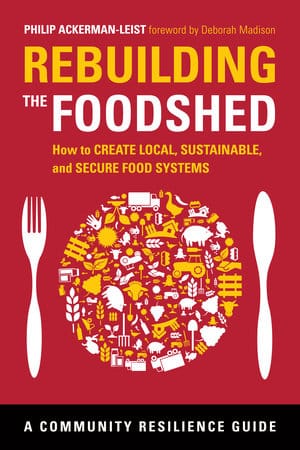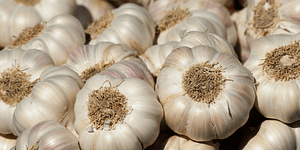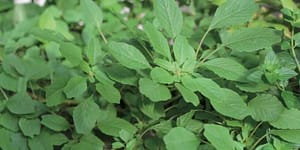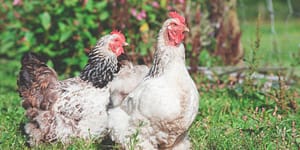A Mini-Festo for Earth Day – Rebuild the Foodshed

For the days leading up to Earth Day in years past, author Philip Ackerman-Leist runs a Twitter MiniFesto campaign – each day sending out a new tweet designed to spark conversation and pass along some lessons he learned whilst working on his book, Rebuilding the Foodshed.
You might also know Philip as the author of his memoir Up Tunket Road or as Director of the Green Mountain College Farm & Food Project and the Director of the Masters in Sustainable Food Systems at Green Mountain College. Or, from his carbon offset approach to commuting to work.
We know that Philip spends some of his time answering tweets and questions from his PastureFone (a mobile phone that doubles as a cattle herding device we think), and we all know that some of our best thinking can come when we’re away from devices, and getting dirty, or frustrated, with our daily chores.
So on this Earth Day we’re offering up the full Minifesto of Ackerman-Leist below, and a link to a downloadable and printable file that you should feel free to print and download, and then put up in the nearest outhouse wall, bathroom stall, or other popular, quiet reading places.
— Your Revolutionary Minifesto Friends at Chelsea Green Publishing
Minifesto: Tweets for Rebuilding the Foodshed
- Start from the grassroots—and move all the way down to the highest levels of government.
- Sustainable farms are run by the sun: the rest of the food system needs daylight, too.
- When thinking about farms: management first & scale second. You figure out where location fits. (Hint: about 1.5)
- Fully understanding the expanse between farm to plate demands the full distance between one’s ears.
- Local was never intended to be universal.
- Small successes are easier to manage than big failures.
- Success leads; policy follows.
- Crow tastes like chicken: Be prepared to eat some.
- Main ingredient in a recipe for disaster: sticking to the recipe when you don’t have all of the ingredients.
- Two ingredients not needed in a recipe for success: us and them.
- Leave the selfie at the door. Shift to panorama mode.
- All white ain’t alright.
- PC quickly becomes passé: Do what’s right, not necessarily what is correct.
- Get off the can (BPA, dude!) and out of the box!
- Change comes more from victual sharing than virtual sharing.
- Food is neither left nor right of center, but in our politics we are left with the right to food question.
- Food system as economic driver: A job doth not a fair wage make.
- The divide is less urban/rural than it is have/have not.
- Trust the windshield view more than the dashboard indicators.
- Don’t just move the needle. Bend it a little bit. When all else fails, consider a new dial.
- Nuance provides precision–and it’s too often the victim of well-intentioned advocacy.
- Numbers & values: sometimes the same thing, sometimes in opposition.
- Behind every label lies a story… some are fairy tales.
- Fields of expertise: Farmers & fishers need to be at the table, too—not just profs, chefs, wonks, & good intentions.
- Finitude sucks. Prioritization rules.
- Don’t forget to dig! (We might even require ag in school if it weren’t so complex.)
- Old dirt, same story: New horizons in soils help cultivate common ground, common sense, & uncommon potential.
- Food system waste is nothing more than a lack of ecological imagination.
- Tomorrow is only 1/3 of the answer.
- Impatience is your most important ally; patience is your best friend.
To follow Philip on Twitter go to @ackermanleistp
Recommended Reads
Recent Articles
The Garlic Clove! This small crop adds a big punch of flavor that complements almost every delicious dish you could think of. And the best part? These two recipes are a breeze to make together!
Read MoreBeavers are ecological and hydrological Swiss Army knives. Capable of tackling just about any landscape-scale problem you might confront.
Read MoreOur love affair with amaranth began long before the pseudo-grain became a trendy staple for gluten-free folk. The luscious leaves of this annual plant are not only packed with a plethora of health benefits.
Read MoreAside from the sheer pleasure of telling your friends, straight-faced, that you maintain your garden using something called a “chicken tractor,” there are a slew of other benefits to working the land with a few of your animal friends. Getting rid of pests without chemicals, for one; letting them do the work of weeding and…
Read MoreIf the idea of running a vegetable farm sounds daunting, you’re not alone. What can you do to simplify techniques and reduce expenses? Where do you even begin?
Read More









